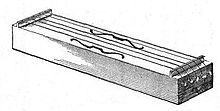Samuel Taylor Coleridge in “Eolian Harp” and Percy Bysshe Shelley in “Mont Blanc” both express pantheistic views, of a connecting spiritual thread that runs through humans and through nature. Yet, these poets reach two different conclusions upon their poems’ ends. Where Coleridge ultimately rejects this pantheistic view in favor of Christianity, Shelley rejects organized religion in favor of this pantheistic, spiritual view of nature.
Coleridge articulates his idea of pantheism as “the one life within us and abroad.” He goes on to compare this “one life” to the aeolian harp:
And what if all of animated nature/ Be but organic harps diversely framed,/ That tremble into thought, as o’er them sweeps,/ Plastic and vast, one intellectual breeze,/ At once the soul of each, and God of all?
Here, Coleridge suggests that nature, humans included, are just instruments for the spirit of imagination, the “intellectual breeze” to play upon. Coleridge, however, in the last part of this poem rejects the pantheist view he offers, instead concluding that this view stems from “shapings of an unregenerate mind,/ Bubbles that glitter as they rise and break.”
Shelley offers a similar pantheistic view in “Mont Blanc. Lines written in the Vale of Chamouni,” where he describes “The everlasting universe of things.” Like Coleridge, he suggests that the human mind is something on which the universal spirit of imagination can inhabit, that the mind “passively now renders and receives fast influencing.” Shelley’s interpretation of the mind as a passive receiver of this universal spirit arises in his “Hymn to Intellectual Beauty” as well, where he references the aeolian harp as well: “Through strings of some still instrument [an aeolian harp]/… Gives grace and truth to life’s unquiet dream.” Unlike Coleridge, however, Shelley does not reject this pantheism in favor of religion, instead embracing this idea of the universal spirit.


